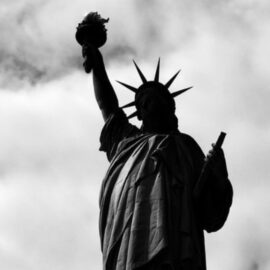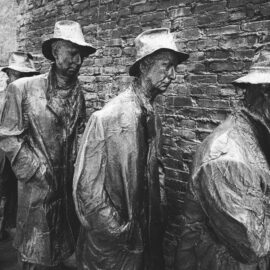

This article is an excerpt from the Shortform book guide to "Mediocre" by Ijeoma Oluo. Shortform has the world's best summaries and analyses of books you should be reading.
Like this article? Sign up for a free trial here.
Are you tired of hearing about white male privilege? Why do mediocre white men still seem to get ahead in life?
Ijeoma Oluo’s book Mediocre explores the concept of the mediocre white male and its impact on society. She argues that systemic advantages for white men can lead to complacency and harm everyone, including white men themselves.
Keep reading to discover how this phenomenon affects our daily lives.
What Is White Male Mediocrity?
Oluo argues that US society is characterized by white male mediocrity, a phenomenon she defines as a pattern of unearned, unjustified privilege afforded to white men. She clarifies that she doesn’t think that all white men are mediocre—rather, she argues that society is structured to favor white men regardless of their merit, which makes many white men complacent while marginalizing everyone else.
We’ll explore the concept of the mediocre white male and explain why Oluo believes it harms everyone, including the white men it ostensibly favors.
How White Male Supremacy Leads to Mediocrity
Oluo suggests that white male mediocrity results directly from white male supremacy: the belief that white men are inherently superior to all other demographic groups. She says that US society reflects a belief in white male supremacy by allocating more power and status to white men in its political, economic, legal, and social systems.
| The Origins of Racial Hierarchy Oluo’s analysis suggests a circular logic to racial hierarchy: US society places white men above everybody else, gives them more chances to succeed, then uses their success as evidence of their superiority. But where did the belief in white superiority come from in the first place? Scholars have proposed a variety of answers to this question: Theory #1: Religion begets ideology. In Caste, Isabel Wilkerson argues that white subjugation of Black people began with a quasi-religious belief that dark-skinned people were destined for servitude. Over time, she says, this belief evolved into a universal acceptance that white people were meant to dominate Black people. Theory #2: Self-interested policies inspire racist justifications. In Stamped From the Beginning, Ibram X. Kendi argues that racism stems not from beliefs, but rather from a need to justify racist political or economic policies enacted primarily out of self-interest. For example, he says the African slave trade began in Europe—and later proliferated in the US—because it was profitable. According to Kendi, only after enslaving African people for economic gain did enslavers justify their actions by claiming that Black people were inferior and that slavery uplifted them. Theory #3: Racism results from normal brain function. In Biased, Jennifer Eberhardt argues that racism begins as a form of categorization—a sort of shortcut by which the brain sorts information into groups for easier processing. She explains that categorization is normal but can easily lead to harmful side effects such as racial stereotyping (for instance, if we lump all people with a certain skin color into a single group and then assign a trait such as “dangerous” or “lazy” to that group). It’s also possible that all of these explanations are true to an extent—that racist beliefs, racist policies, and innate bias have all played a part in the development of white male supremacy as it exists today. |
According to Oluo, the US’s tendency to privilege white men leads to two major consequences.
Consequence #1: Marginalization of Other Races and Genders
Oluo argues that since white male supremacy holds white men up as great because of their presumed superiority to other races and genders, white male supremacist society has a vested interest in excluding from power anyone who isn’t a white man. Under this system, women and racial minorities are taught to stay out of the way and, at best, to aspire to white male ideals of greatness.
(Shortform note: In Stamped From the Beginning, Kendi argues that these white male standards don’t just affirm the supposed superiority of white men, but they also reinforce the supposed inferiority of everyone else. He explains that even when Black people do achieve white standards of success, they’re often dismissed as extraordinary exceptions, as when then-senator Joe Biden described Barack Obama as “the first mainstream African-American who is articulate and bright and clean and a nice-looking guy.”)
Moreover, Oluo says, the white male ideal is inherently problematic: Because it depends on enforcing a sense of superiority over others, white male supremacy tends to glorify and reward bullying, overconfidence, and prejudice. White male society has historically defended its power through violence, exploitation, and undermining the accomplishments of others.
(Shortform note: The aggressive, bullying male ideal Oluo describes resembles what’s become known in pop culture as toxic masculinity, a set of behaviors and attitudes that glorifies power, physical strength, emotionlessness, and domination of others. Research suggests that even when men and boys don’t buy into toxic masculinity, they may feel pressured by peers and society at large to act in toxic ways—often with consequences to their own physical and mental health and to the well-being of those around them.)
Consequence #2: Complacency for White Men and Society
Furthermore, Oluo argues that the assumption of inherent greatness breeds individual mediocrity by suggesting that simply existing as a white man is an accomplishment. She reasons that when greatness is defined by race and sex rather than by one’s accomplishments, there’s no incentive to change or improve—certainly not when doing so would involve taking risks or inconveniencing oneself for the sake of society.
Similarly, Oluo suggests that white male supremacy makes society as a whole mediocre by creating an illusion of meritocracy. Our public and private systems are ostensibly built to hire, promote, elect, and advance only the most competent candidates. But in practice, Oluo says, these systems unjustly favor white men, whose presumed greatness gives them a greater chance of attaining power in the first place and holding on to that power even when they prove ineffective.
(Shortform note: In addition to potentially making white men complacent, the assumption of white male greatness can also perpetuate racial bias among nonwhite people. As Wilkerson argues in Caste, that’s in part because those subjugated by a racist society can reproduce that society’s biases, as when Black people judge each other’s skin color or ethnicity. Similarly, Kendi argues in Stamped From the Beginning that Black leaders sometimes reproduce racist views in their calls for their communities to take more responsibility and to avoid supposedly harmful cultural trends like gangsta rap—as Kendi explains, these calls buy into the faulty idea that society is meritocratic and that Black people could get ahead if they just tried hard enough.)
How White Male Mediocrity Harms White Men
Oluo says that in addition to the more obvious harm it does to people who aren’t white or male, white male mediocrity also harms the white men it’s designed to favor: While in theory, white male supremacy gives white men power and prominence, in practice, only a small proportion of white men actually receive these benefits. Most white men don’t actually inherit significant wealth or power—yet white male supremacy mollifies non-elite white men by implying that their turn will come and reminding them that in the meantime, they’re still better than everyone else.
The problem, Oluo says, is that most white men who don’t inherit significant power or wealth are unlikely to attain either—and when they become frustrated at not getting what they believe is their due, they lash out either at themselves or at minorities they believe have stolen their place. Oluo points out that suicide rates and instances of domestic terrorism are disproportionately high among white men. She reasons that both forms of violence are opposite expressions of a singular phenomenon: When white men are told they’re entitled to power and success they don’t actually have, they conclude either that they’ve failed (leading to self-directed violence) or that they’ve been wronged (leading to violence against others).
| Status, Honor, and Self-Destructive Politics In Strangers in Their Own Land, Arlie Hochschild offers a further explanation of how white supremacy deflects blame for systemic failures away from the social system that’s failed and onto minority groups. She argues that this deflection is especially common in the US South, where many white conservatives base their identities on a sense of honor and dignity that’s deeply linked with their traditional place of privilege in the social (and racial) hierarchy. According to Hochschild, many white conservatives resent what they see as minorities “cutting in line” via affirmative action and similar programs, immigration-friendly policies, and cultural trends such as the growing acceptance of LGBTQ+ people. Hochschild explains that these white conservatives value hard work, and when they find themselves suffering financially, they often believe that’s because the federal government is taking their hard-earned pay and redistributing it to lazy, dishonorable aid recipients. Hochschild also points to another way that this racial resentment and deflected blame harms white people: It leads them to vote in ways that ultimately harm their own interests. She argues that some conservative politicians prey on white voters’ resentments, frustrations, and fears to gain power—only to then enact laws and policies that allow the economic and environmental exploitation of these typically working-class citizens. |

———End of Preview———
Like what you just read? Read the rest of the world's best book summary and analysis of Ijeoma Oluo's "Mediocre" at Shortform.
Here's what you'll find in our full Mediocre summary:
- Why underqualified white men are in powerful positions
- How toxic white men have reacted to social progress
- The presence of white supremacy in American football






